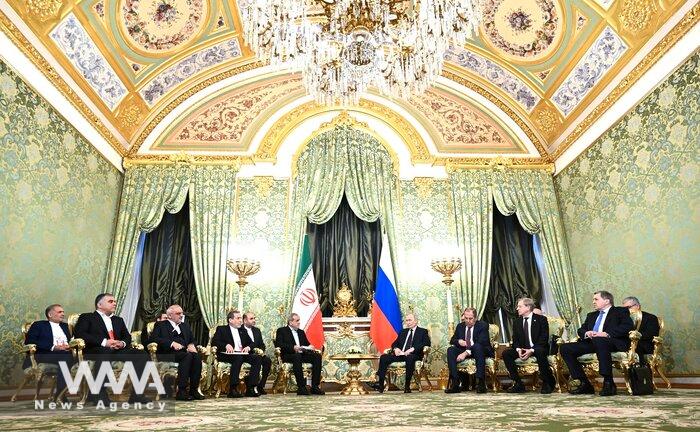Iran-Russia Cooperation: A Step Towards Countering the U.S. Unipolar Order
WANA (Jan 17) – In today’s world, where the pace of political, economic, and international developments is accelerating, collaboration among nations is no longer a mere choice but a necessity to address complex global challenges. The relationship between Iran and Russia is a prime example of such convergence—a bond that, in recent years, has evolved from limited cooperation to multilayered and strategic interactions.
Historical Roots and the Need for Enhanced Cooperation
As Ali Beman Eghbali, an expert on Eurasian affairs, highlights, Iran and Russia share a longstanding history of relations. However, in recent decades, this relationship has entered a new phase. Eghbali believes that both nations, given their unique political, geographical, economic, and cultural capacities, have the potential to foster deeper collaboration.
He underscores that while the determination of both nations’ leaders to strengthen ties is evident, the full potential of their partnership has yet to be realized. This untapped potential could significantly alter regional and international dynamics in favor of Tehran and Moscow.

A New Chapter in Iran-Russia Relations: Comprehensive Agreement on the Horizon
WANA (Jan 12) – The upcoming trip of Masoud Pezeshkian, the President of Iran, to Moscow, Russia, is of particular importance, as during this visit, a comprehensive cooperation agreement between the two countries is expected to be signed. This event is not only the first step in the Islamic Republic era toward signing a […]
Recent Developments: The 20-Year Cooperation Agreement
One of the most significant steps toward bolstering ties is the signing of the 20-year cooperation agreement between Iran and Russia. According to Eghbali, this agreement is designed to address contemporary needs and challenges, laying the groundwork for deeper economic, security, and technological collaboration.
At a time when the dynamics of West Asia are rapidly shifting, closer Iran-Russia relations can not only advance the interests of both countries but also play a crucial role in shaping a multipolar global order. As Iran’s president recently stated, “A more just world is possible through regional convergence.” This convergence is a pivotal step in countering the dominance of Western powers.
Putin: Best Wishes to #Iran‘s #SupremeLeader
“What is being done in #Russia-Iran bilateral matters is under his guidance and supervision,” Putin stated. pic.twitter.com/LUTJqLHRqD
— WANA News Agency (@WANAIran) January 17, 2025
An Anti-Hegemonic Approach and Multilateral Collaboration
Eghbali asserts that Iran-Russia cooperation on the international stage is vital for transitioning away from a unipolar system and resisting U.S. unilateralism. For over four decades, Iran has withstood U.S. pressures and sanctions. This valuable experience, combined with Russia’s status as a permanent member of the UN Security Council, provides a platform for enhanced collaboration within organizations such as the Shanghai Cooperation Organization (SCO), BRICS, and the Eurasian Economic Union (EAEU).
During the BRICS summit, Iran’s Foreign Minister emphasized, “Iran’s engagement with regional blocs is a key component of its grand strategy to drive economic development and mitigate the effects of sanctions.”
Economic and Technological Horizons
A cornerstone of Iran-Russia relations is cooperation in economic and technological domains. By focusing on trade using national currencies and facilitating financial infrastructure, both nations can reduce dependence on Western systems.
Additionally, opportunities in transportation infrastructure, advanced industries, and defense programs indicate that their strategic relations are steadily expanding.

New Details of the Agreement Between Iran and Russia
WANA (Jan 11) – The ambassador of the Islamic Republic of Iran in Russia announced: “The comprehensive cooperation agreement between the two countries, comprising a preamble and 47 articles, covers all areas of bilateral relations. Its drafting paid special attention to balance, maintaining independence, and respecting territorial integrity.” Historical Context and Agreement Renewal Kazem […]
Untapped Opportunities in Tourism and Public Perception
Russia’s vast tourism potential and the growing interest of Russian travelers in international destinations present an opportunity Iran must capitalize on.
Initiatives such as visa waivers, easing financial transactions, and providing quality services to Russian tourists could significantly enhance Iran’s share in this market.

Iran-Russia Relations: A Forward-Looking Perspective
As the global landscape shifts toward multipolarity, closer ties between Iran and Russia can serve as an effective model for tackling shared challenges and seizing regional opportunities. However, any strategic engagement must prioritize mutual benefits and regional peace.
Today, Iran-Russia cooperation transcends mere economic interests. These relations provide a platform for reshaping the global order and achieving a more balanced future. The time has come to chart new horizons with a shared determination.













